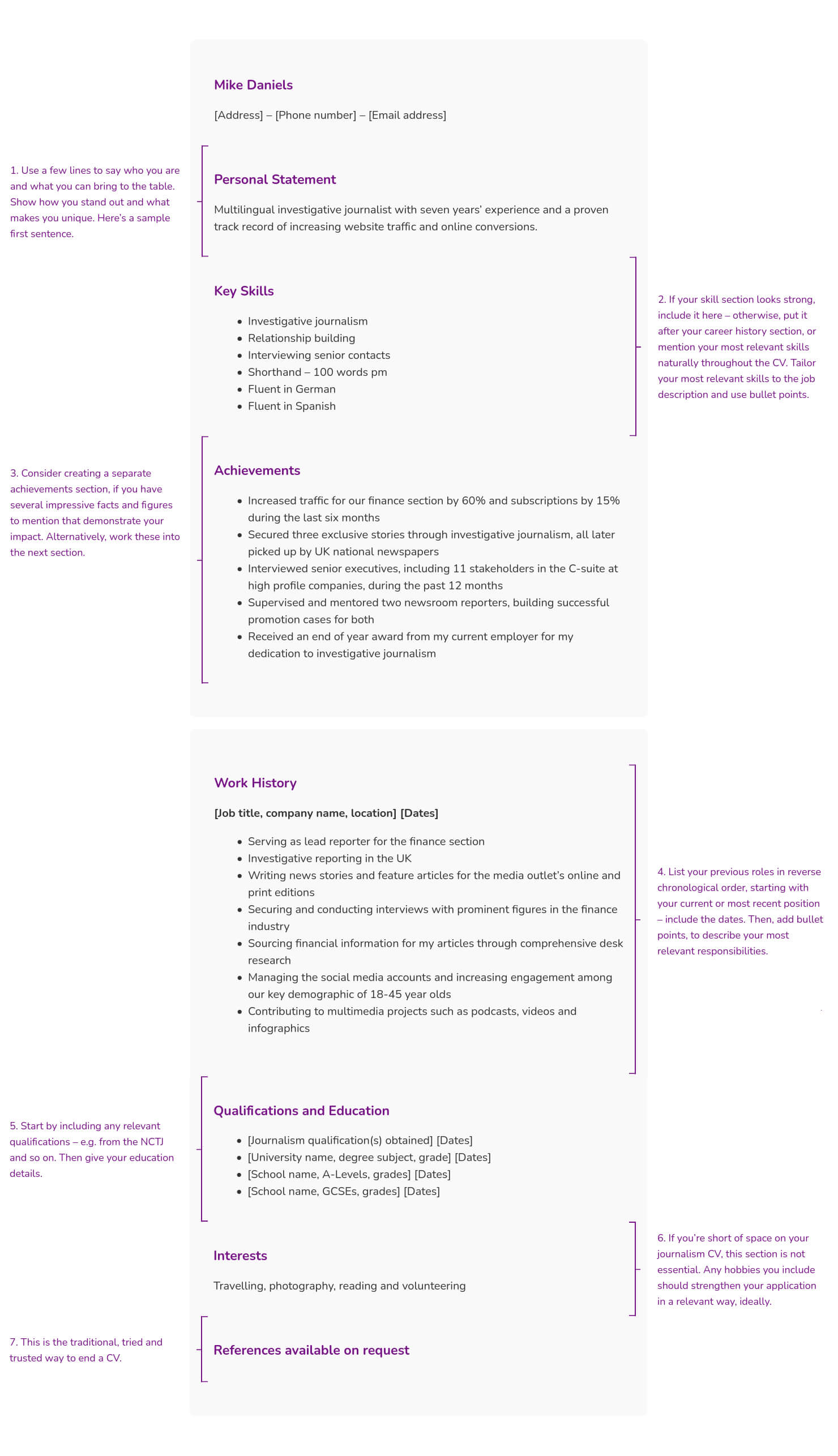Just as your articles need to grab readers’ attention straightaway, any journalism CV must do that too… In this guide we’ll outline how to write a strong journalist CV.
A career in journalism is increasingly popular, according to Statista. There were 110,000 UK journalists in 2021, compared to 61,100 in 2011, reportedly.
Journalists are more likely to write for online formats than before. Now only 44% write for print newspapers while 52% work online, the Reuters Institute reports.
And younger generations are changing how people get their news. Televised current affairs is still popular overall – but teenagers are more likely to browse Instagram, TikTok and YouTube for news, according to Ofcom.
Here’s how to write a journalist CV. And if you’re looking for a journalist CV example, we can help with that too – near the end of this blog, we’ll share a sample format to help you make a start.
Starting your journalism CV
If you are just starting out as a journalist, or have been in the same role for several years, perhaps you haven’t written a CV in a long time. For a full overview and some general tips, here’s how to write a CV – our comprehensive guide.
You of all people know the importance of a strong headline. We’ve previously written about how to come up with perfect CV headlines – and how to end a CV the right way too.
There’s another principle of journalism that’s important to keep in mind when writing your CV – know your audience. Hiring managers have lots of CVs to read and may only spend a few seconds skimming through yours, so keep the layout simple and effective.
Do:
- Write a strong personal statement: Explain what you can bring to the table and why you’re unique. Focus on getting this part right – otherwise, the reader may not continue.
- Highlight your achievements: Describe your journalism career so far using specific details. Whether it was a full-time role or summer work experience, sell yourself.
- Mention your qualifications and hard skills: Some will likely be more relevant for the role than others, so tailor them to the job description.
Don’t:
- Lie on a CV – ever.
- Include personal details such as your marital status or age.
- Add references – provide them later in the application process if they ask.
- Put your photo on a CV in the UK.
Take care not to use generalisations on your journalism CV. In the next section, we’ll explore how to describe your career successes so far in specific detail.
Journalist CV skills
The job advertisements you’re responding to from LinkedIn and other sources will mention several soft or hard skills, either essential or desired.
Including a skills section is a quick way to show employers you have these. Alternatively, you can work your skillset into the personal statement and career experience sections.
While it will vary depending on the role, typical skills you’ll often see on a journalist job ad include:
- NCTJ qualification
- Finding exclusives
- Breaking news
- Storytelling
- SEO writing
- News-gathering
- Investigative research
- Content management
- Digital strategy
- Keyword research
- Data visualisation
- Video editing
Again, some of your soft skills will be more useful than others – decide which ones are most relevant for the specific role. Journalism soft skills often involve:
- Working independently and in a team
- Strong communication skills
- Capable of working to tight deadlines
- Perfect attention to detail
- Working under pressure
For your strongest skills, back them up with evidence to avoid making generalisations. Let’s explore how to do this.
Show your impact
For online journalism, use any metrics you have access to when demonstrating the impact of your writing.
If you can show how engagement has increased over time – likes, shares and so on – that will look good on your CV.
Include any relevant and impressive facts, figures or stats you can to showcase your successes.
Highlight your achievements and of course if you have any awards or accolades to talk about, that’s great.
This evidence will have more impact in the right context. Try using the STAR method to make sure your best achievements stand out.
Taking this into account, here are some excerpts from one of our journalist CV examples to get the ball rolling.
Journalism CV example

Mike Daniels
[Address] – [Phone number] – [Email address]
Personal Statement
Multilingual investigative journalist with seven years’ experience and a proven track record of increasing website traffic and online conversions.
Key Skills
- Investigative journalism
- Relationship building
- Interviewing senior contacts
- Shorthand – 100 words pm
- Fluent in German
- Fluent in Spanish
Achievements
- Increased traffic for our finance section by 60% and subscriptions by 15% during the last six months
- Secured three exclusive stories through investigative journalism, all later picked up by UK national newspapers
- Interviewed senior executives, including 11 stakeholders in the C-suite at high profile companies, during the past 12 months
- Supervised and mentored two newsroom reporters, building successful promotion cases for both
- Received an end of year award from my current employer for my dedication to investigative journalism
Work History
[Role, company name, location] [Dates]
- Serving as lead reporter for the finance section
- Investigative reporting in the UK
- Writing news stories and feature articles for the media outlet’s online and print editions
- Securing and conducting interviews with prominent figures in the finance industry
- Sourcing financial information for my articles through comprehensive desk research
- Managing the social media accounts and increasing engagement among our key demographic of 18-45 year olds
- Contributing to multimedia projects such as podcasts, videos and infographics
Qualifications and Education
- [Journalism qualification(s) obtained] [Dates]
- [University name, degree subject, grade] [Dates]
- [School name, A-Levels, grades] [Dates]
- [School name, GCSEs, grades] [Dates]
Interests
Travelling, photography, reading and volunteering
References available on request
Final advice
You’ve written all about your achievements and passion for the job – don’t undo all that hard work by making a basic mistake.
It goes without saying, but you need very strong attention to detail for a journalism career and your CV is no different. Check it thoroughly to find any mistakes and fix them!
Remember, customise every CV to each company you’re applying to. Use their job advert, website, social media channels and any other relevant sources to adjust your application.
With this knowledge, you may want to tailor your personal statement or reword how you describe certain aspects of your work history. Then recheck your CV for any new errors you’ve made.
And if you’re going for a broadcast journalism role, we explain what a video CV is and debate whether you need one in this guide.
Summary: How to write a journalist CV
Highlight any unique skills you have and what makes you an impressive candidate, then build your CV around these points.
Take your time and make sure your personal statement has no filler, clunky grammar etc – these little touches can make all the difference when a busy hiring manager reads your CV.
We hope this guide has given you some ideas for putting together a journalism CV that does justice to your career so far.
For other careers, check out our blog. For example, here are our guides on how to write a:
We also have a dedicated guide on how to become a journalist.
If you need some help putting one together, look no further – we’re CV writing experts. We know how to write an outstanding journalism CV, so please don’t hesitate to get in touch for more information.


